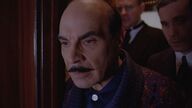Later, on the streets of Istanbul, Poirot witnessed the stoning of a woman who was found by her husband for adultery. At the same time, there was another woman who witnessed the incident. The woman was very sad because a woman who was already pregnant with a child was stoned to death by everyone. On the Orient Express, Poirot meets this lady, who feels wronged by the dead woman, and Poirot is still on the side of the rule of law, although he is equally sad about it.
Poirot stood firm in both cases, believing in the justice of the legal decision, but he struggled inwardly. This can be seen from the fact that he reiterated his inner sadness twice when he and the lady discussed the incident of the woman being executed by stoning. out. But as a detective and enforcer of the law, this struggle will never go away for him. The murder on the Orient Express once again puts Poirot in a dilemma between love and law. Although love and law are always in conflict, when the final mystery is revealed, the words he said are still powerful: fairness and justice should be decided by the law, even if the law is sometimes unfair, but we should have full confidence in the law.
I believe Poirot is right. Even if he suffers from a dilemma, human beings must always have a criterion for survival. The so-called criterion is that it will not change due to any special circumstances. Today, we advocate the rule of law society, because human beings have proved that under the rule of law, the loss of this society can be minimized. Only under the supervision of unreasonable laws can there be fairness and justice.
View more about Murder on the Orient Express reviews











